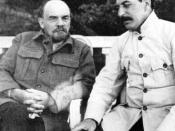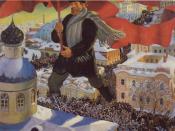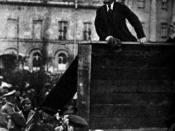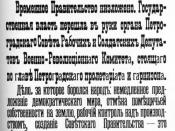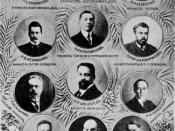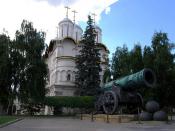Russia, like many other countries, has an extensive history of battles stemming from which way of government is the right way of government. The revolutions and civil wars that went on in Russia resulted in millions of death and repression to those who were spared. These disputes over the way to govern can be traced back to the days of autocracies.
Tsar Nicholas II is often thought of as a horrible leader. The majority of his people were very unsatisfied with his rule but listened to him anyways for reasons of fear and worries of surviving. However, during World War I, conditions were so intolerable that the people finally decided to overthrow the Tsar. They were starving, the prices of goods and food were outrageous, and above all, the Russians were tired of being at war. The people were also upset because the Tsar appointed unqualified officials and seemed to be influenced by Rasputin, a strange and inelegant man hired to heal the Tsar's son.
The workers in Petrograd protested food shortages and government. The Tsar sent his secret police to break up the protests, but this was a failure because the soldiers handed their weapons over to the workers. The workers then took over the government, and the Tsar abdicated his throne.
A Provisional government made up of Tsarist officials and other wealthy people took over and would stay in power until a constitution was written. The Provisional government was the official power but very few listened to them, probably because Russia remained in the war, which is exactly what the Russian's didn't want. The Provisional Government, looking for support, gave complete freedom to the people, which didn't really help them gain to much support. Also, at this time the Petrograd Soviets, communists organized into committees, were emerging. The Soviets wanted the workers to run factories together, and for the soviet soldiers to replace army officials. The Soviets were trusted by the workers and soldiers, and in turn, actually had more power then the Provisional Government.
One branch of the Communists, the Bolsheviks, led by Lenin believed the Petrograd Soviet still wasn't catering enough to the workers discomfort. Lenin wanted the Bolsheviks to lead a revolution into the streets to solve these problems. This revolution occurred in October and during it, Lenin made promises to the people such as, "Peace, Bread, and Land." Leon Trotsky, another Bolshevik, captured areas of Petrograd and stormed the Winter Palace along with the Red army. The Provisional Government was so out of sorts that they didn't even react.
After the October Revolution, a civil war broke out between the Reds and the Whites. World War I was still going on, therefore allies were interfering with the war, but eventually they got tired of fighting and gave up, along with the whites. Upon winning this war, Russia now belonged to the Bolsheviks. Lenin put his New Economic Policy into effect. Businesses were taken over and were run by committees of workers and financial equality was established. The people elected a Supreme Soviet and the Bolsheviks stepped down, although they remained as the Politburo, which Stalin and Trotsky were members of, and still got to make the decisions. Lenin had to make some compromises like outlawing strikes and allowing peasants to farm their own land. He also sold much of the peasants' grain to fund the Civil War. As Lenin became more powerful, he seemed to be becoming a member of the bourgeois class, along with the other members of the Politburo. Lenin knew he had opposition and felt the need to create a secret police force that would tell the people to do what he thought was best for them. He also outlawed debates and dismissed the Supreme Soviet. Before long, Lenin was a dictator; he must have been scared that all his work on communism would go to waste.
In 1922 Lenin suffered a stroke and in 1924 he died. In those two years, he had nothing to do with the Politburo, and Stalin and Trotsky were both trying to gain power. Stalin had been appointed General Secretary of the party and was in charge of appointing people to their positions. He used his position much to his advantage and had Trotsky removed from Russia. Stalin appointed the Politburo all new members, members who only know Stalin's beliefs, and none of Lenin's. Stalin was now the new dictator and was very afraid of losing his power. Anyone who was a threat to his power was killed or made to leave the country. Stalin put a lot of fear into the people and stripped them of their human rights, but he did accomplish some things such as increasing industrial output and having a good nuclear and space program.
Lenin's idea for Russia being the perfect Communist nation obviously didn't work out. There was too much opposition from the people, and the government and the people still weren't equal. The time of the Tsar and the time of Lenin and Stalin are actually quite similar. The people were always scared of the government and what they would do; the people never got a chance to actually say what they wanted. They were just told what was best for them. If Lenin would have followed true Marxism and Stalin followed in his path, maybe Russia could have thrived as a Communist nation.
